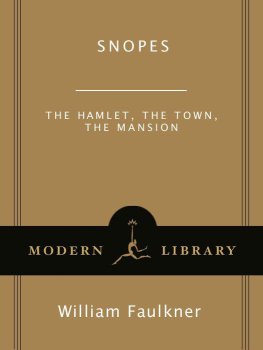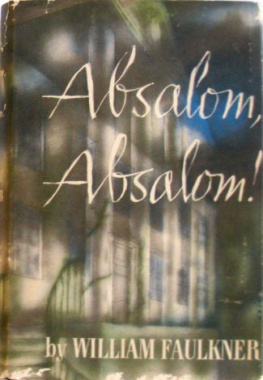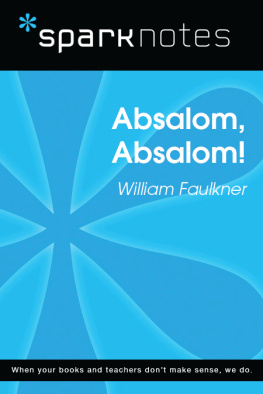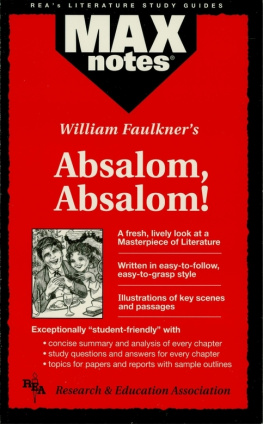Reading Faulkner
ABSALOM, ABSALOM!
READING FAULKNER SERIES
Noel Polk, Series Editor
Reading Faulkner
ABSALOM, ABSALOM!
Glossary and Commentary by
JOSEPH R. URGO
and
NOEL POLK

www.upress.state.ms.us
The University Press of Mississippi is a member of the Association of American University Presses.
Copyright 2010 by University Press of Mississippi
All rights reserved
Manufactured in the United States of America
First printing 2010
Library of Congress Cataloging-in-Publication Data
Urgo, Joseph R.
Reading Faulkner. Absalom, Absalom! : glossary and commentary
/ by Joseph R. Urgo and Noel Polk.
p. cm. (Reading Faulkner series)
Includes bibliographical references and index.
ISBN 978-1-60473-434-8 (cloth : alk. paper) 1. Faulkner, William, 18971962. Absalom, Absalom! 2. Faulkner, William, 18971962LanguageGlossaries, etc. 3. MississippiIn literature. 4. Plantation life in literature. 5. Race in literature. I. Polk,
Noel. II. Title.
PS3511.A86A76 2010
813.52dc22 2009021659
British Library Cataloging-in-Publication Data available
Noel Polk: For my Grandchildren,
Sam, Emily, and Francie
Joseph R. Urgo: For Lesley
CONTENTS
Absalom, Absalom!
GLOSSARY AND COMMENTARY
SERIES PREFACE
This volume is one of a series of glossaries of Faulkners novels which is the brainchild of the late James Hinkle, who established its principles, selected the authors, worked long hours with each of us in various stages of planning and preparation, and then died before seeing any of the volumes in print. The series derives from Jims hardcore commitment to the principle that readers must understand each word in Faulkners difficult novels at its most basic, literal level before hoping to understand the works larger issues. In pursuit of this principle, Jim, a non-Southerner, spent years of his scholarly life reading about the South and things Southern, in order to learn all he could about sharecropping, about hame strings, about mule fact and lore, about the Civil War, about blockade running, duelling, slavery and Reconstruction, Indian culture and history. When he had learned all he could from published sources, he betook himself to county and city archives to find what he could there. He was intrigued by Faulkners names, for example, and over the years compiled a fascinating and invaluable commentary on their etymologies, their cultural and historical backgrounds, and, not least, their pronunciations: Jim is the only person I know of who listened to all of the tapes of Faulkners readings and interviews at the University of Virginia, in order to hear how Faulkner himself pronounced the names and words he wrote. In short, for Jim, there was no detail too fine, no fact or supposition too arcane to be of interest or potential significance for readers of Faulkner: he took great pleasure in opening up the atoms of Faulkners world, and in exploring the cosmos he found there.
It was my great fortune and pleasure to be Jims friend and colleague for slightly more than a decade. In the late seventies, I managed to tell him something he didnt know; he smiled and we were friends for life. Our friendship involved an ongoing competition to discover and pass on something the other didnt know. I was mostly on the losing end of this competition, though of course ultimately the winner because of what I learned from him. It was extremely agreeable to me to supply him with some arcana or other because of the sheer delight he took in learning somethinganything, no matter how large or small.
On numerous occasions before and after the inception of this series, we spent hours with each other and with other Faulkner scholars reading the novels aloud, pausing to parse out a difficult passage, to look up a word we didnt understand, to discuss historical and mythological allusions, to work through the visual details of a scene to make sure we understood exactly what was happening, to complete Faulkners interruptions, to fill in his gaps, and to be certain that we paid as much attention to the unfamiliar passages as we did to the better-known ones, not to let a single word escape our scrutiny; we also paused quite frequently, to savor what we had just read. These readings were a significant part of my education in Faulkner, and Im forever grateful to Jim for his friendship and his guidance.
This series, Reading Faulkner, grows out of these experiences in reading Faulkner aloud, the effort to understand every nuance of meaning contained in the words. The volumes in the series will try to provide, for new readers and for old hands, a handy guide not just to the novels allusions, chronologies, Southernisms, and difficult words, but also to its more difficult passages.
Jims death in December 1990 was a great loss to Faulkner studies; it was especially grievous to those of us embarked with him on this series. Absent his guidance, the University Press of Mississippi asked me to assume editorship of the series; I am happy to continue the work he started. The volumes in the series will not be what they would have been had Jim lived, but they all will bear his stamp and his spirit, and they all will try to be worthy of his high standards. And they will all be lovingly dedicated to his memory.
Noel Polk
INTRODUCTION
Although those who concern themselves with details are regarded as folk
of limited intelligence, it seems to me that this part is essential, because
it is the foundation, and it is impossible to erect any building or establish
any method without understanding its principles. It is not enough to
have a liking for architecture. One must also know stone-cutting.
Saxe, quoted in Foucault, Discipline & Punish
When he completed Absalom, Absalom! in May 1936, Faulkner said, I think its the best novel yet written by an American (Blotner 364). That assessment remains valid. It is also among the most demanding of American novels, one which, as one critic said in 1954, should have no casual readers (Scott 219). What we found in applying the methods of the Reading Faulkner series to Absalom, Absalom! is that the novel has in fact had generations of casual readers (including both of us) who have understandably been drawn to a handful of critical, powerfully meaningful passages, while too often leaving unremarked the particulars of the novels less arresting, perhaps more difficult, ones. A discerning reader in 1974 described what a close reading of Absalom, Absalom! in its entirety demands: Faulkner presents a novel as if the reader was not going to read it consecutively page by page but rather was going to be able to perceive the entire work simultaneously like a painting, and no doubt the closer the reader is able to approach this impossible ideal the closer he will come to a perfect understanding of the novel (William Brown 219).
What we attempt in this volume is simultaneity: to create a resource capable of providing the reader a holistic rendering of the novel by attending, paradoxically, to its partsindividual words, phrases, and sentences. In a novel concerned so intimately with what is ultimately knowable in history and in human affairs, we have sought throughout the text to separate what is documentable fact from speculation and to provide as reliable as possible an accounting of what Faulkners language actually says. Making such a claim would be fatuous were it not for the texts explicit demonstration of the function of speculation in human truth claims.
Next page





